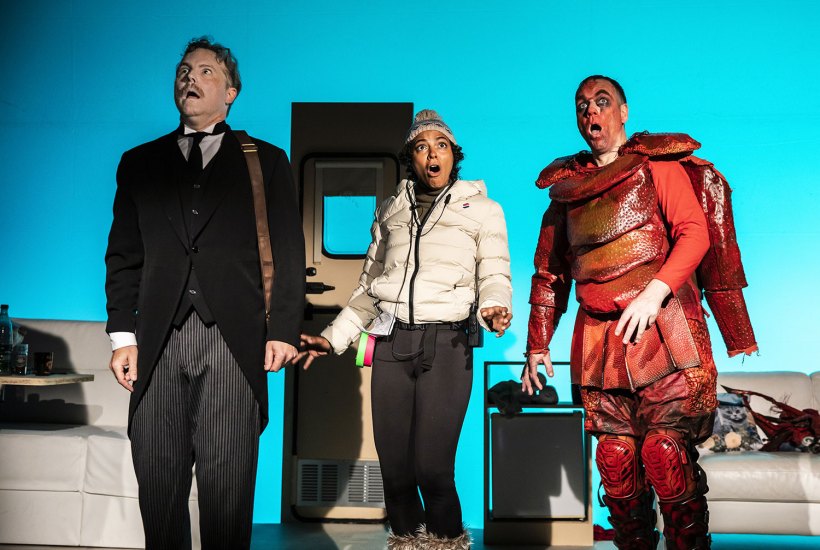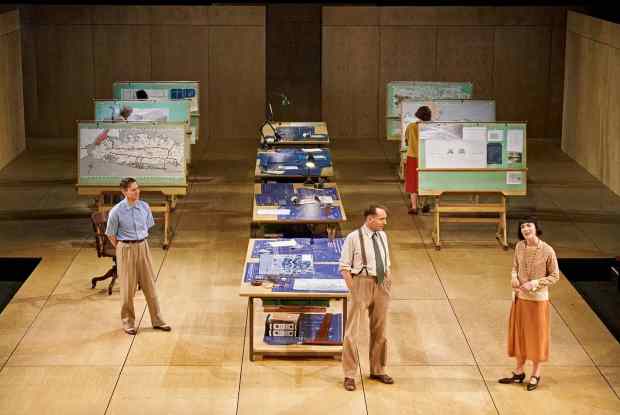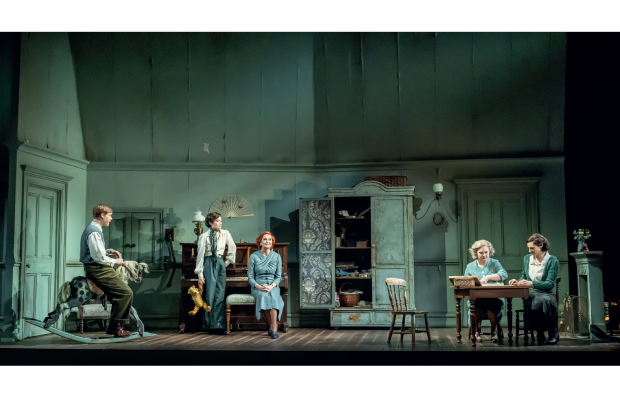It sounds like a barking-mad student sketch but the final product is marinated in wisdom and maturity. It’s Headed Straight Towards Us is a mellow riot of a play. The setting is a rocky glacier in Iceland during the filming of a corny sci-fi movie. Hugh (Sam West) is a cerebral thesp who specialises in playing butlers and high-status toffs. On set, he meets his best friend from drama school, Gary (Rufus Hound), whose career has declined to the point where he’ll accept any role going. Tragic Gary used to be a star who earned a fortune as a cockney villain in the 1980s but he succumbed to alcoholism and ill discipline, and he now has little in common with Hugh who lives in London with a couple of pet dogs and a solicitous male lover. He’s horrified when Gary barges into his luxurious campervan and demands companionship and gallons of wine. But gradually the old pals start to bond as they gloat over the excesses and pratfalls of their former colleagues.
Hugh is fixated by Daniel Day-Lewis who, he says, ‘made 14 pairs of riding boots while filming The Last of the Mohicans’. Gary simmers with hostility towards the mothers of his many children and he convinces himself that the young runner (played by the excellent Nenda Neururer) is his long-lost daughter. The script is a lot smarter than it wants to admit. In truth, this is a symbolist drama that examines two halves of a single character. Hugh stands for circumspect intelligence, Gary for knee-jerk instinct.
The ancient binaries are beautifully revived in a crisp, witty script from Nigel Planer and Ade Edmondson. They end their story on a bleak note that calls to mind the most wretched depths of 20th-century existentialism. But there’s laughter added. It’s like watching a Ionesco classic without enduring the weight of footnotes, asterisks and impenetrable marginalia. If you like, it’s Godot with gags. Superb direction by Rachel Kavanaugh. And a semi-miraculous set by Michael Taylor that manages to suggest the orgasmic convulsions of an earthquake that rumbles beneath the Icelandic permafrost. Could the show manage a West End transfer? Tricky. The lead actors, begging their pardon, are not quite starry enough. Perhaps the authors, Planer and Edmondson, would make a better job of convincing potential investors to take a punt.
Octopolis is a slick new romcom set on a university campus. The main character, George, is a widowed marine biologist who spent her career pestering a captive octopus in the name of science. She and her deceased husband liked to withhold food from the poor beast until it changed colour. Once it had performed this trick, they gave it a morsel of nourishment while they wrote up their notes in scholarly essays. It never occurred to them that they were guilty of animal cruelty.
George is visited by a thrusting young anthropologist, Harry, who lectures her on the topic of civilisation and its progress from magic to religion, and finally to science. Fascinating stuff but it belongs in a seminar room, not a theatre. Eventually, the two boffins leap into bed together and their erudite jabber continues as they navigate the terms of their hurried affair. The script feels a little tricksy because the characters read out the stage directions as well as their dense, wordy dialogue. At its best the show perfectly captures the mindset of ambitious university types. They’re garrulous and argumentative, ceaselessly curious and maddeningly logical; and they can be fickle, narcissistic and emotionally brutal too. If you know a teenager whom you wish to inoculate against a career in academia this play will prove highly effective.
But the story is unsatisfactory as a romance. We hear too much about the love-lorn squid-fancier, George, and not enough about her strapping young paramour. Where did he come from? On what terms are they cohabiting? Is the action set in an office, a laboratory, or a campus bedsit? Or is it a bit of all three? Above all, we need to know what drove Harry into the arms of a lonesome fish-botherer who looks about 15 years his senior. And the romance comes to fruition far too fast. As soon as the affair begins, George mentions ‘love’ without realising how scary that word sounds in the exhilarating early stages of a fling. She’s in her fifties but she acts like a giddy teenager ravished by a dashing film star.
The writer, Marek Horn, evidently appreciates the finickity intellectual habits of academics but his pedantry doesn’t extend to the play’s title. The word ‘Octopolis’ means ‘eight cities’. The term he wants is ‘octopodopolis’ which means ‘a city of eight-legged things’. If you found that philological aside interesting, you’ll like this play. If it you didn’t, you won’t.
Got something to add? Join the discussion and comment below.
Get 10 issues for just $10
Subscribe to The Spectator Australia today for the next 10 magazine issues, plus full online access, for just $10.
You might disagree with half of it, but you’ll enjoy reading all of it. Try your first month for free, then just $2 a week for the remainder of your first year.














Comments
Don't miss out
Join the conversation with other Spectator Australia readers. Subscribe to leave a comment.
SUBSCRIBEAlready a subscriber? Log in